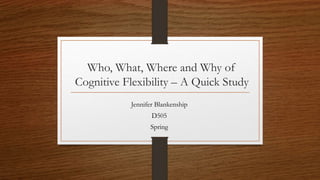
Cognitive flexibility
- 1. Who, What, Where and Why of Cognitive Flexibility – A Quick Study Jennifer Blankenship D505 Spring
- 2. What happens after you get the general idea about something? Lessons and learning stop being presented “using a linear model” (Boger-Mehall, 1996)
- 3. Who? Rand Spiro Paul Feltovich Richard Coulson A quick survey of the most cited works regarding Cognitive Flexibility reveal three predominant authors:
- 4. What: Ill-structured domains An ill-structured domain exists “when relevant prior knowledge is not readily organized to fit a situation” (Spiro, Vispoel, Schmitz, Samarapungavan, & Boerger, 1987). For example, the example below wouldn’t be a very good lesson in week two of a physics class. . . Unless you had students with extensive background knowledge regarding the topic. For students of advanced physics and extensive background knowledge it is possible to access that experience and education to bring them to mastery of Cauchy’s theorem:
- 5. Ill-structured domains There is a distinction made between “well-structured domains” (WSDs) and “ill-structured domains (ISDs). The important things to make note of are that the instructional “theories appropriate for WSDs are in many ways inappropriate for ISDs” and “that transfer in ISDs is best promoted by knowledge representations that possess the following features:” (Spiro et al., 1987)
- 6. Ill- structured domains • Multiple interconnectedness between different aspects of domain knowledge • Multidimensional or multiperspectival representation of examples/cases • Allowance for various forms of naturally occurring complexity and irregularity (Spiro et al., 1987)
- 7. Ill- structured domains There is a catch . . . You can’t just pick up this stuff. Ill- structured domains are complex in nature and the goal is not just “mere exposure to content and the establishment of a general orientation to a field” (Spiro et al., 1988). Learning in ill-focused domain content areas is on “advanced knowledge acquisition” in which “the learner must attain a deeper understanding of content material, reason with it, and apply it flexibly in diverse contexts” (1988).
- 8. What: Defining Cognitive Flexibility “A critical goal of many education programs, especially in professional education, is to help the students transfer what they have learned to different, even unique, situations” (Boger-Mehall, 1996) Congitive Flexibility encourages “multiple knowledge representations” understanding that “single perspectives are not false, they are inadequate” (Spiro, Feltovich, Jacobson, & Coulson, 1991)
- 9. The Introduction to Flexibility - 1987 • Spiro, Vispoel, Schmitz, Samarapungavan, & Boerger proposed when a student is working within an ill-structured domain “the key factors affecting the success with which prior knowledge is used to improve performance in a new situation will be the flexibility with which the relevant prior knowledge is represented in memory, and the mastery or control the individual has over those flexible representations (the ability to recombine elements of the representations, reorder the importance of elements in different contexts, and so on)” (1987).
- 10. What are the goals? According to Spiro, Collins, Thota, and Feltovich, Cognitive Flexibility Theory works to “address four main goals” which are: • Helping people to learn important but difficult subject matter • Fostering adaptively flexible use knowledge in real-world settings • Changing underlying ways of thinking • Developing hypermedia learning environments to promote complex learning and flexible knowledge application (Spiro et al., 1991)
- 11. What it is not – Single Case Study and Simplification “Straightforward, linear instruction in the form of tutorials, lectures, and many other formats will, according to cognitive flexibility theory, fail to accomplish important educational objectives in part because of oversimplification of the material presented” (Boger-Mehall, 1996). It is not based in single case study. “Simplification of complex subject matter makes it easier for teacher to teach,” however it results in students who “lack the ability to use their knowledge in new ways, the ability to think for themselves” (Spiro et al., 87).
- 12. Where is the basis for this theory? According to Boger-Mehall “cognitive flexibility theory supports the basic assumptions of constructivism” and “it promotes authentic, realistic experiences for each individual.” “It encourages the use of multiple pathways and multiple purposes when approaching problems” (1996)
- 13. Why is this important? “Oversimplification” was researched in the medical field and found to produce “more than a dozen serious errors in the concepts held by a majority of medical students tested.” They found that “these levels of misconception interact in reciprocally supportive ways, and combine to yield higher order misconceptions.” (Spiro et al., 1987)
- 14. How can this theory be applied? Spiro, Coulson, Feltovich, and Anderson found in their research that certain “conditions for developing mastery of complexity and knowledge transferability” were present. They noted, among other conditions that it is important to practice an “avoidance of oversimplification and overregularization,” and mentioned that instructors must use “multiple representations” because “complex concepts can rarely be adequately represented using a single schema, theoretical perspective, line of exposition, and so on.” (1988).
- 15. The Wrap Up • Cognitive Flexibility is based in constructivist theory, encourages instructors and facilitators to avoid oversimplification but to utilize multiple representations of cases for complex learning domains that require advanced knowledge acquisition • Authors who are commonly referenced with this theory are: Spiro, Feltovich, and Coulson • It is important to utilize the practices encouraged in this theory to avoid producing students who are knowledgeable about the subject matter and terminology, but are unable to apply their learning in complex domains.
- 16. References Boger-Mehall, S. (1996). Cognitive Flexibility Theory: Implications for Teaching and Teacher Education. Society for Information Technology & Teacher Education International Conference, (pp. 991-993). Chesapeake. Spiro, R., Coulson, R., Feltovich, P., & Anderson, D. (1988). Cognitive flexibility theory: advanced knowledge acquisition in ill-structured domains. Champaign, Illinois: Center for the study of reading. Spiro, R., Vispoel, W. P., Schmitz, J. G., Samarapungavan, A., & Boeger, A. E. (1987). Knowledge acquisition for application: cognitive flexibility and transfer in complex content domains. Champaign, Illinois: Center for the study of reading.
